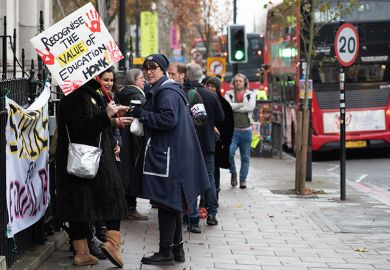Source: Reuters
Behind the blockade: trip will assess the effect on education of women and girls
Plans to send academic trade union members to the Gaza Strip to view the effects of the Israeli blockade have been branded as dangerous and an unjustifiable use of money.
Delegates at the University and College Union’s congress voted to send a group of union members “as soon as possible” to the territory, despite Foreign and Commonwealth Office advice that Britons should not travel there.
According to the motion supported by the congress, at least half of the delegation will be women and the trip will take place “in liaison with the Palestine Solidarity Campaign”. Those on the visit are likely to report back to the UCU’s national executive committee to help inform union policy on Gaza, which was likened in 2010 by Prime Minister David Cameron to a “prison camp” because of the strict Israeli restrictions on its borders.
Some delegates have raised concerns over safety as the trip will follow the break-up of a 100-strong women’s delegation to Gaza in March, in which dozens of human rights campaigners en route to Gaza were detained at the airport in Cairo before being deported by Egyptian officials.
In light of the serious injuries suffered by some of the campaigners during their detention, Emma-Jane Phillips, representing Northumbria University, said the UCU’s planned trip was misguided.
Pick your battles
“We are ignoring clear safety advice issued by the FCO, and we will struggle to get travel insurance,” Ms Phillips said. “I also don’t know how we can justify spending thousands of pounds of members’ funds on this trip when we have so many major disputes and battles to fight [nearer to home],” she added.
The money for the trip to Gaza should be put towards the union’s strike fund, which supports UCU members while they go unpaid during industrial disputes, she said.
But Ann Blair, from the University of Leeds, said the trip would be vital to learning how the education of women and girls in Gaza had been affected by the blockade.
“Some will see this as a side issue, but [women’s education] is central to our aims and objectives,” Ms Blair said.
She added that she expected the delegation to comprise “no more than half a dozen” people and could be done in a cost-effective way.
“These people will come back with a much deeper understanding of the situation and will communicate it in a much more meaningful way,” Ms Blair said.
She added that she had “some sympathy” for those worried about the costs to be incurred by the UCU, which has been forced to make job cuts because of declining membership, which fell by about 9,000 last year to 107,538 in April.
The trip is also likely to reopen the vexed issue of the UCU’s political stance towards Israel, which has alienated some Jewish academics.
A number of policies adopted at previous UCU congresses led to legal action by Ronnie Fraser, a mathematics lecturer, who claimed that anti-Israeli motions amounted to anti-Semitism.
That claim was lost, although the UCU had to spend about £580,000 in defending the action, which was made at an employment tribunal.
Register to continue
Why register?
- Registration is free and only takes a moment
- Once registered, you can read 3 articles a month
- Sign up for our newsletter
Subscribe
Or subscribe for unlimited access to:
- Unlimited access to news, views, insights & reviews
- Digital editions
- Digital access to THE’s university and college rankings analysis
Already registered or a current subscriber? Login





